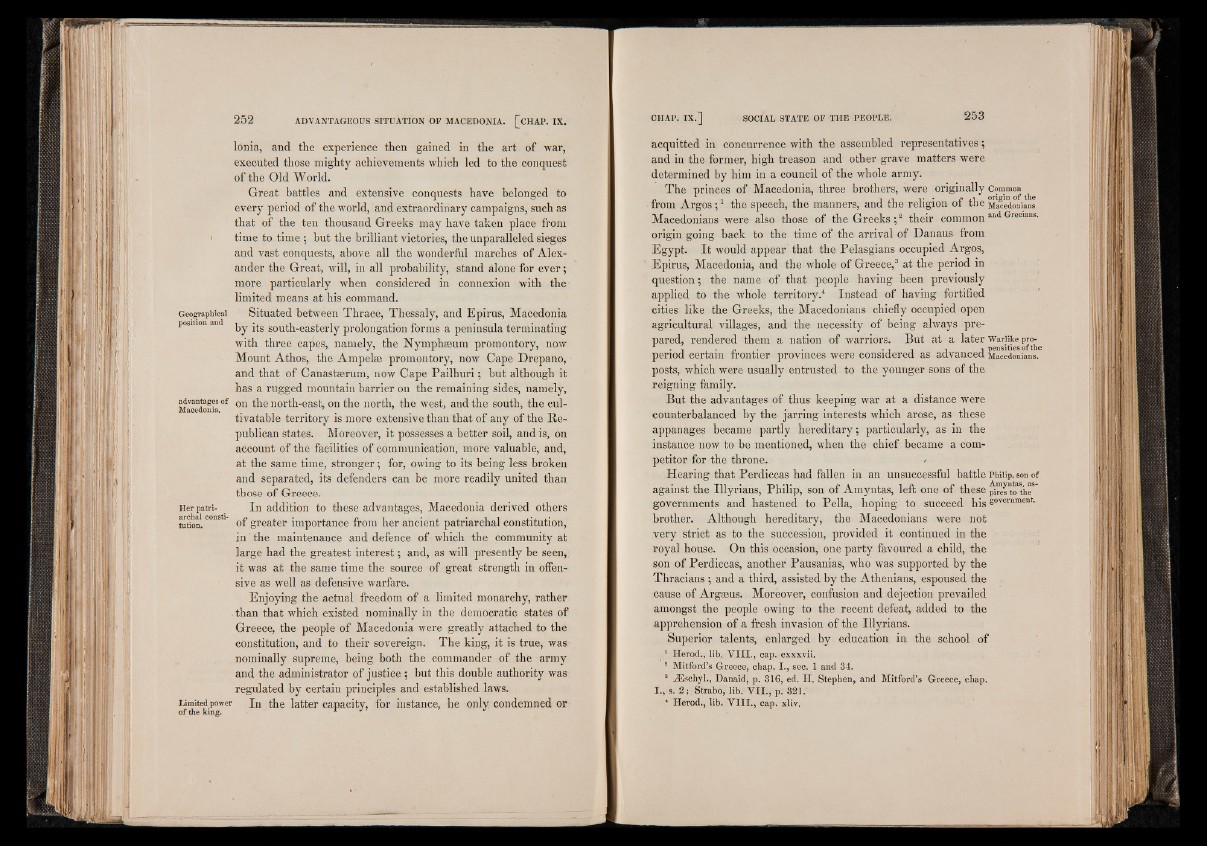
Ionia, and the experience then gained in the art of war,
executed those mighty achievements which led to the conquest
of the Old World.
Great battles and extensive conquests have belonged to
every period of the world, and extraordinary campaigns, such as
that of the ten thousand Greeks may have taken place from
i time to time ; but the brilliant victories, the unparalleled sieges
and vast conquests, above all the wonderful marches of Alexander
the Great, will, in all probability, stand alone for ever;
more particularly when considered in connexion with the
limited means at his command.
Geographical Situated between Thrace, Thessaly, and Epirus, Macedonia
posi ion an jj.g SOuth-easterly prolongation forms a peninsula terminating
with three capes, namely, the Nymphaeum promontory, now
Mount Athos, the Ampeke promontory, now Cape Drepano,
and that of Canastserum, now Cape Pailhuri; but although it
has a rugged mountain barrier on the remaining sides, namely,
advantages o f on the north-east, on the north, the west, and the south, the cul- Macedonia. . . 7 . 7 7
tivatable territory is more extensive than that of any of the Republican
states. Moreover, it possesses a better soil, and is, on
account of the facilities of communication, more valuable, and,
at the same time, stronger; for, owing to its being less broken
and separated, its defenders can be more readily united than
those of Greece.
H e rp a tri- In addition to these advantages, Macedonia derived others
tution. of greater importance from her ancient patriarchal constitution,
in ' the maintenance and defence of which the community at
large had the greatest interest; and, as will presently be seen,;
it was at the same time the source of great strength in offensive
as well as defensive warfare.
Enjoying the actual freedom of a limited monarchy, rather
-than that which existed nominally in the democratic states of
Greece, the people of Macedonia were greatly attached to the
constitution, and to their sovereign. The king, it is true, was-
nominally supreme, being both the commander of the army
and the administrator of justice ; but this double authority was
regulated by certain principles and established laws.
Limited power In the latter capacity, for instance, he only condemned or
o f the king. *■
acquitted in concurrence with the assembled representatives;
and in the former, high treason and other grave matters were
determined by him in a council of the whole army.
The princes of Macedonia, three brothers, were originally Common
from Argos ; 1 the speech, the manners, and the religion of the Macedonians
Macedonians were also those of the Greeks ;8 their common ar,d Grecians-
origin going back to the time of the arrival of Danaus from
Egypt. It would appear that the Pelasgians occupied Argos,
Epirus, Macedonia, and the whole of Greece,3 at the period in
question; the name of that people having been previously
applied to the whole territory.4 Instead of having fortified
cities like the Greeks, the Macedonians chiefly occupied open
agricultural villages, and the necessity of being always prepared,
rendered them a nation of warriors. But at a later Warlike pro-
. , n . * 1 1 j j pensities of the period certain frontier provinces were considered as advanced Macedonians,
posts, which were usually entrusted to the younger sons of the
reigning family.
But the advantages of thus keeping war at a distance were
counterbalanced by the jarring interests which arose, as these
appanages became partly hereditary; particularly, as in the
instance now to be mentioned, when the chief became a competitor
for the throne. >
Hearing that Perdiccas had fallen in an unsuccessful battle Philip, son of
against the Illyrians, Philip, son of Amyntas, left one of these V™JS^the*
governments and hastened to Pella, hoping to succeed his g°vernment-
brother. Although hereditary, the Macedonians were not
very strict as to the succession, provided it continued in the
royal house. On this occasion, one party favoured a child, the
son of Perdiccas, another Pausanias, who was supported by the
Thracians ; and a third, assisted by the Athenians, espoused the
cause of Argaeus. Moreover, confusion and dejection prevailed
amongst the people owing to the recent defeat, added to the
apprehension of a fresh invasion of the Illyrians.
Superior talents, enlarged by education in the school of
1 Herod., lib. V I I I ., cap. cxxxvii.
2 Mitford’s Greece, chap. I., sec. 1 and 34.
3 iEschyl., Danaid, p. 316, ed. II. Stephen, and Mitford’s Greece, chap.
I., s. 2 ; Strabo, lib. V I I ., p. 321.'
4 Herod., lib. V I I I ., cap. xliv.